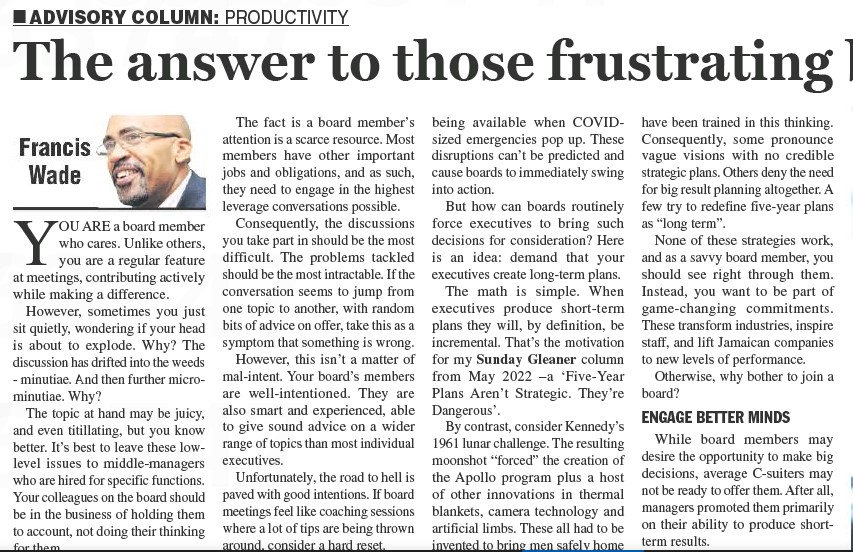As a dedicated board member, you actively contribute to meetings and aim to make a meaningful impact. However, there are moments when you find yourself quietly frustrated, wondering if the discussion has veered into the minutiae, and then even further into micro-details. Why does this happen?
While the topics at hand may be interesting, you understand that such operational details are better left to middle managers who specialize in these functions. The board’s role should be holding these managers accountable, not getting lost in the weeds.
After an hour or two of discussion, you may find that little progress has been made. This can leave you shaking your head in disbelief, thinking that there are more productive uses of your time.
So, how can you address this issue before your frustration reaches a breaking point?
- Focus on What Truly Matters
Board members have limited time, often juggling other important responsibilities. Therefore, it’s crucial to engage in high-leverage discussions. Your participation should be reserved for tackling the most challenging and intractable problems. If discussions jump around with random advice, it’s a sign that something needs to change.
It’s important to note that your fellow board members are well-intentioned, smart, and experienced. They can provide valuable insights on various topics. However, the aim should be to make significant decisions during board meetings, not to offer scattered tips.
- Encourage Decisive Actions
Some board members believe that major decisions only come into play during unexpected emergencies. While these situations demand immediate attention, boards can also proactively influence decision-making.
One effective approach is to require your executives to develop long-term plans. Short-term plans tend to be incremental, as discussed in my May 2022 column, “Five-Year Plans Aren’t Strategic. They’re Dangerous.”
For inspiration, consider Kennedy’s lunar challenge in 1961. This ambitious goal led to the creation of the Apollo program and spurred innovations in various fields. To foster big decisions, challenge your CEO or MD to articulate a bold, long-term vision for the organization.
Few top executives have been trained in this kind of thinking. Some offer vague visions with no concrete plans, while others attempt to rebrand five-year plans as “long-term.” As a discerning board member, you should seek game-changing commitments that transform industries and elevate your company’s performance.
- Engage the Best Minds
While board members may be eager to make significant decisions, many C-Suite executives might not be ready for such audacious goals. They are often promoted based on their ability to deliver short-term results.
You can encourage a shift in mindset by introducing the concept of “big, hairy, audacious goals” (BHAGs) with long-term horizons. While this may seem unconventional and risky to some, it’s the right approach. As a board member, your role is to challenge assumptions, ensure the credibility of plans, and evaluate end-game scenarios.
Your collective expertise can add rigor to the management team’s plans and elevate the quality of discussions. Over time, this focused process can lead to game-changing outcomes, making board meetings inspiring and far less frustrating.

